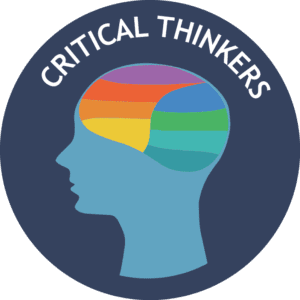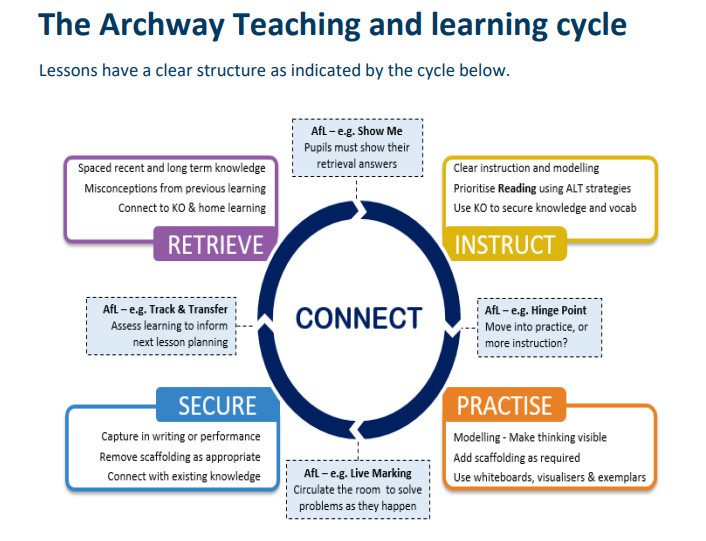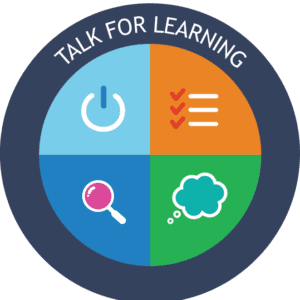Archway Teaching and learning framework
Archway Teaching and learning framework In the Archway learning trust there are underpinning expectations of how we do great teaching and learning. This includes; Archway knowledge curriculum, Core expectations, High impact pedagogies and research informed innovation.
Core expectations-These are the central expectations to a great classroom.
High impact pedagogy-These five evidence-informed, practical strategies build and secure powerful knowledge for our students. Our teachers plan their lessons with a clear focus on these five high[1]impact strategies as can be seen above
Research informed innovation-Archway are passionate about enriching teaching and learning with research-informed innovation into effective teaching and learning. Our teachers read, watch, listen to and engage in vibrant learning opportunities within and beyond the Trust, trialling, developing and sharing innovative practice.

Critical Thinkers

What are CRITICAL thinkers?
CRITICAL thinkers have the skills to be to be Challenged, Resilient, Independent, Thoughtful, Imaginative, Collaborative, Leaders. Our vision is to produce pupils that have the CRITICAL thinker skills so that they can go into the world with the key skills that will allow them to aspire to be whatever they hope to be and form an integral part of society. These skills are weaved throughout our curriculum and tutor periods to build in opportunities for pupils to practice these skills in a safe and inclusive environment.
How do I become a CRITICAL thinker?
· Actively engage in all my lessons
· Learn how to do talk for learning through my tutor periods and lessons
· Follow the PERFECT model (which is described later)
CRITICAL thinkers are celebrated
We celebrate our CRITICAL thinkers by awarding positive points and displaying work that has been nominated by staff to show an outstanding demonstration of that skill. Rewards are given for receiving positive points and there is the pride in having been nominated by a teacher.

Retrieve
Retrieval is at the start of every lesson and consistent of interleaved questions that test knowledge from a long time ago and more recent. Pupils are expected to do this in silence and with no notes and it should last around 5 minutes. Pupils then self-mark this using purple pen.
Instruct
This is the phase of the lesson when direct instruction is given by the teacher and new information or skills are taught. This could be through reading, videos, teacher talk and modelling etc.
Practise
This is the phase of lesson where pupils are given a chance to practise the content that we have taught them in the instruction phase. Pupils during practise will need modelling and scaffolding to allow them to access the learning.
Secure
To check that pupils fully understand they are given an opportunity to do work on their own and the teacher checks the pupils understanding. Movement between the phase can mean that you go back to practise if more modelling is needed or further instruction. It is important to track and transfer into the next lesson, building on the previous learning and understanding of each lesson.
Talk for Learning


Building Metacognitive Learners
Metacognition is learning about how you learn and being able to self-regulate your own learning. At Bluecoat Aspley we don’t want to have pupils that can just learn from their teachers, we want pupils that can independently learn themselves.
Metacognition and self-regulation approaches aim to help pupils think about their own learning more explicitly, by teaching them specific strategies for preparing, planning, monitoring and reflecting on their learning. Lessons and tutor times are designed to give pupils a repertoire of strategies to choose from and the skills to select the most suitable strategy for a given learning task.
Staff will support students by modelling this initially until pupils are confident to do it on their own.
Talk for learning underpins all parts of learning in a lesson, revision and homework. This is the structure of how pupils should talk through how they are learning and adjust it if it is not working.
Prepare: What learning can I do to prepare me for my lesson?
Plan: Have I done this before? What skills do I need?
Monitor: How is it going? Do I need to change what I am doing?
Reflect: How did it go? Did I need to do it differently?
Pupils can use the Talk for learning prompts in different ways, such as:
-
-
- Think aloud: Pupils question themselves out loud using the prompt questions above.
- Think hard: Teachers challenge pupils and make them think hard with a challenging
curriculum. Pupils are also expected to Challenge themselves to think about difficult problems and attempt to come up with solutions using the questions above. It is ok to get things wrong, kit is this process that allows us to learn better. - Think together: Pupils work collaboratively to think through their ideas, work with a
partner and then compare ideas with a group and then as a class to build on ideas. Together
we are stronger. - Think alone: Pupils have time when the teacher will assess them, or they will assess themselves. They are checking their understanding.
-
To learn more about the Perfect Model, becoming a Critical thinker and our different Teaching and Learning methods by reading our Teaching and Learning Handbook


